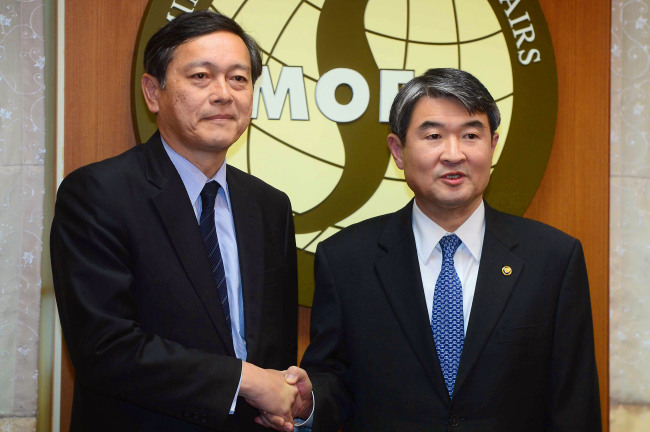Korean, Japanese officials hold fence-mending talks
By Shin Hyon-heePublished : March 12, 2014 - 21:17
Vice foreign ministers of Korea and Japan held talks on Wednesday in Seoul in an apparent attempt to mend the two countries’ relations frayed by the Shinzo Abe government’s increasingly hawkish policies on historical and territorial issues.
Cho Tae-yong and Akitaka Saiki were expected to have discussed bilateral ties and the situation on the peninsula, possibly including Japan’s wartime sex slavery and other historical issues.
Cho Tae-yong and Akitaka Saiki were expected to have discussed bilateral ties and the situation on the peninsula, possibly including Japan’s wartime sex slavery and other historical issues.

The meeting marks the first high-level dialogue since Abe’s visit to a controversial war shrine in Tokyo in late December, which Seoul condemned as an attempt to whitewash the country’s imperial past. The two countries had their last vice ministerial talks last July.
The checkered relationship appears to have plunged to a fresh low with provocative moves by the nationalist premier, including a proposed revamp of a landmark 1993 apology for Japan’s mobilization of front-line brothels.
For Cho, who took office late last month, the talks would also offer a chance to build rapport with his Japanese counterpart.
During the consultations, Saiki may have proposed a bilateral summit between President Park Geun-hye and Abe or a trilateral one including U.S. President Barack Obama on the sidelines of a global nuclear security summit in The Hague on March 24-25, Japanese media reported, citing Tokyo officials.
“It’s not that we’re opposed to having a summit with Japan,” Cho told reporters before the meeting convened.
“But there should be faith that it will be a fruitful summit based on correct historical views as the foundation of the bilateral relations.”
Park, who has held at least two summits with each of the leaders of the U.S., China and Russia since her swearing-in a year ago, has yet to meet with Abe, in contrast to her predecessors, who had talks with their Japanese counterparts within their first year in office.
The U.S. has been ratcheting up pressure on its two top regional allies to work to improve their ties ahead of Obama’s planned trip in April.
While in Seoul last month, U.S. Secretary of State John Kerry said that positive Korea-Japan relations are “in the best interests” of Washington given their shared values and robust economic and strategic partnerships, though he expressed respect for “deeply felt historical differences.”
Korea, however, was unmoved by the overture, remaining steadfast in its demand that the Abe leadership take substantive steps to resolve historical issues.
In his keynote speech at the U.N. Human Rights Council in Geneva last week, Seoul’s Foreign Minister Yun Byung-se said the issue of the so-called comfort women concerns “universal human rights,” urging Tokyo’s political leaders to admit to its past wrongdoings, take responsibility and carry out correct history education.
Meanwhile, Adm. Choi Yun-hee, chairman of the Joint Chiefs of Staff, said Tuesday that he will cautiously pursue security cooperation with Japan, stressing the need for a three-way partnership with the U.S. in the face of North Korean threats.
“We will seek to develop (bilateral cooperation) by taking into account Korea-Japan relations and other progress,” he told reporters after visiting a memorial for Korean War veterans in Washington.
“It’s not that military cooperation will be coming about immediately between Korea and Japan ― it will come about within the framework of our government policy.”
Choi’s remarks apparently reflect the strained bilateral ties, which worsened in June 2012 after the two countries called off the signing of their first military pact aimed at facilitating intelligence-sharing amid vehement opposition by civic groups and opposition lawmakers.
By Shin Hyon-hee (heeshin@heraldcorp.com)







![[Hello India] Hyundai Motor vows to boost 'clean mobility' in India](http://res.heraldm.com/phpwas/restmb_idxmake.php?idx=644&simg=/content/image/2024/04/25/20240425050672_0.jpg&u=)









